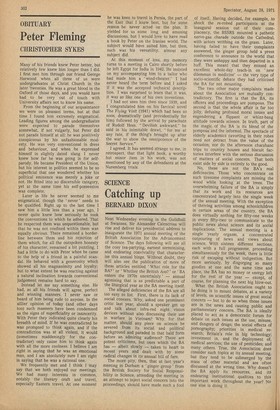OBITUARY
Peter Fleming
CHRISTOPHER SYKES
Many of his friends knew Peter better, but relatively few knew him longer than I did. I first met him through our friend George Harwood when all three of us were undergraduates at Christ Church in the later 'twenties. He was a great blood in the Oxford of those days, and you would have had to be very out of touch with University affairs not to know his name.
From the beginning of our acquaintance we were on pleasant terms, but at that time I found him extremely enigmatical. Leading figures among the undergraduates were expected to parade themselves somewhat, if not vulgarly, but Peter did not parade himself at all: he was positively conspicuous by his unfashionable modesty. He was very conventional in dress and behaviour, and when he expressed himself in slightly dated slang I never knew how far he was going in for selfparody. He became President of the Union, but his interest in politics seemed to be so superficial that one wondered whether his political eminence was merely a joke or not. He fitted into no discernible category, yet at the same time his self-possession was complete.
Later in life he never seemed to me enigmatical, though the ' never ' needs to be qualified. Right up to the last time I saw him a little less than a year ago, I never quite knew how seriously he took the conventions to which he adhered. That he respected them was unquestionable, but that he was not confined within them was equally obvious. There remained a borderline between them and his rejection of them which, for all the outspoken honesty of his character, remained a bit puzzling. I had a little to do with Peter when he came to the help of a friend in a painful scandal. He behaved with a generosity which showed all his magnanimity and loyalty; but to what extent he was reacting against a natural inclination towards conventional judgement remains hard to say.
Instead let me say something else. He had, as all his friends will agree, perfect and winning manners. I never saw or heard of him being rude to anyone. In the sillier opinion of today (and other days too) such manners have been condemned as the signs of superficiality or insincerity. With Peter they indicated quite clearly his breadth of mind. If he was contradicted he was prompted to think again, and if the contradiction was at all violent, it would (sometimes maddeningly for the contradictor) only cause him to think again with all the more coolness. I believe I am right in saying that he was an emotional man, and I am absolutely sure I am right in saying that he was a rational one.
We frequently met and I think I may say that we both enjoyed our meetings. We had many interests in common, notably the literary craft and travel, especially Eastern travel. At one moment he was keen to travel in Persia, the part of the East that I knew best, but for some reason he never acted on the plan. It yielded for us some long and amusing discussions, but I would love to have read a book by Peter on the Iranian world. The subject would have suited him, but then, such was his versatility, almost any subject did.
At this moment of loss, my memory turns to a meeting in Cairo shortly before he left Egypt for India in 1942. He insisted on my accompanying him to a tailor who had made him a 'wind-cheater.' I had never heard the term before and I asked if it was the accepted technical description. I was surprised to learn that it was, it was so like one of his own inventions.
I had not seen him then since 1939, and I congratulated him on his farcical novel The Flying Visit (1941) which had been so soon, dramatically (and providentially for him) followed by the arrival by parachute of Rudolf. Hess. " Devilish awkward," he said in his inimitable drawl, "for me at any rate, if the thing's brought up after the war to show the omnipotence of the Secret Service."
I agreed. It has seemed strange to me, in retrospect, that that light book, a worthy but minor item in his work, was not mentioned by any of the defendants at the Nuremberg trials.


































 Previous page
Previous page